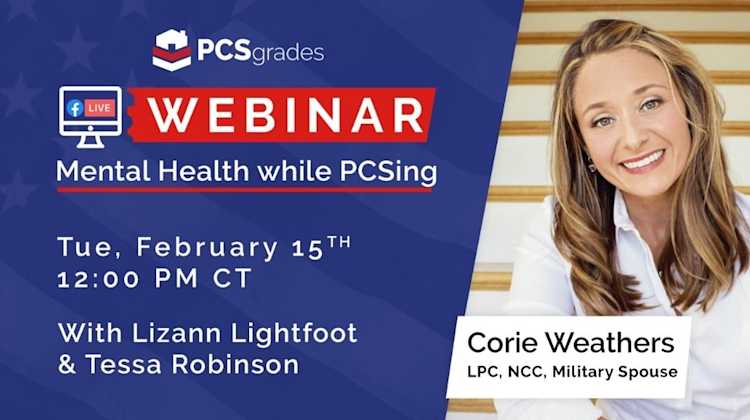Mental Health and Self Care During a PCS
by Lizann Lightfoot - November 1st, 2021
How can a PCS cause stress in our lives?
There’s so much, but just the stress of packing–even when someone else is doing it for you–is frustrating. Before that, you have to downsize your things, deal with coordinating logistics of pets and cars, transitioning kids to new schools, etc. The biggest is often the loss of community. It is a grieving process: saying goodbye to what you have known. There is a lot of stress related to timing: you may be living in temporary housing for months, and there is always the issue with delays from damaged goods. Having to learn about the new area and establish connections is also stressful, having to ask strangers to be your emergency contact.
Watch the full video interview here:
How does stress affect our mental health when we move?
Everything we just mentioned–plus additional personal experiences–really impacts our mental health. Stress is a real killer. It is difficult to reduce stress during a move and keep your mental health intact, because each move has different new challenges and different levels of disaster. It takes a toll on the whole family’s mental health. It’s important to look out for your well-being.
Knowing these stresses, how can we set realistic expectations to manage stress?
It really starts with being easy on ourselves–either have very easy expectations, or start with outlining realistic scenarios. We all know that things won’t go according to plan, and there will be problems when we move, but we also know that ourselves and all our friends have survived this so we can do it again.
Rephrase your self-talk so instead of always dreading it and expecting the worst, you are able to tell yourself, “I can do this. It’s going to be okay.” Talk to others and ask for help. Delegate tasks to kids and your service member so you do not overwhelm yourself. Sure, they are busy, but so are you. You have to take time to decompress, even if it’s just a few minutes in the morning. It’s okay to get takeout sometimes. Be realistic!
Read more about mental health when PCSing in our webinar here.
What about when you aren't moving but your friends are the ones who are moving? What do you say to those who remain behind during PCS season?
Make a plan to stay connected, either virtually or by phone calls. Have coffee and conversation, connect through social media, etc. Make sure that you grieve this loss and acknowledge that you are going through a grief process, but look forward to connecting with new people. Supporting others helps us feel better about what comes next. Providing support to others is a great way to support ourselves through that “see you later” process.
You need to have a self-care awareness and know that there are things you can do to help you stay centered during that transition phase.
Kids understand PCS very differently than adults. How can we help kids through a PCS move??
Our kids are an important piece, because they go through even more than we do. Adults get to plan and organize, but kids don’t always have any control or share their processing. For us, an important strategy is social stories. Use pictures of the new school and neighborhood online to show them to your kids and share social stories–what the new place looks like, things to look forward to, etc.
Set up appointments so they can visit the school ahead of time and maybe meet new friends. Email the school to connect with a teacher ahead of time. They are going through complex feelings, so host a get-together to help them say goodbye to their friends and process that grief. If your kids are old enough, collect all the video game names of their friends so they can still play games together and stay connected after the move.
How can we have realistic self-care during a PCS?
Remember that self-care is absolutely necessary and imperative. You can schedule 15 minutes into your day for you. Either get up before everyone else, use an app like Headspace for meditation, or listen to music at times throughout the day. This can be a time-out for you to take care of yourself and have something that brings you joy. Put it into your calendar or set a timer on your phone. Also, invest in something like takeout or pre-made meals and other short cuts that make your life easier. It’s all about helping yourself breathe a little easier.
Communicate with the people around you. Say something. Let them know when you need a break. Don’t suffer under a sense of obligation, because it shouldn’t all be on you. We need an army of people to handle a PCS! Shift to delegation in work and in life. Learn to share the burden, it is so vital to your own stress level, and it teaches your kid responsibility.
For a military spouse, delegation is asking for help. You have to let go and trust other people to take care of things. It does get easier as you practice it.
How can we help our kids with self-care if they need more than a nap or some outside time?
Yes, part of it is giving them their own timeout. You have to help them do things they enjoy like connecting with their friends to help them process. And you have to let them talk about their feelings. In kids, depression looks different from adults. It looks like irritability and anger. Reach out to a professional if they need someone to talk to. Help them process the loss and give them someone to talk to. Normally, staying up late to talk with friends or play a game together would be restricted, but you may have to loosen the rules or let them do things that typically aren’t allowed to help make things easier for them and for you.
If our children are showing signs of depression after a move, are there resources available for them?
It depends on the level you are seeing. If it is just sadness and crankiness after the move, it will probably wear off in a short amount of time. But anything lasting over a month or showing deeper signs of clinical depression is important to get help. Of course we have Tricare and their resources, but Military One Source also provides counselors for kids. MFLC (Military Family Life Consultants/ Counselors) on bases will help with mental health concerns. There are military crisis lines for 24/7 phone numbers, but if you see any signs of emergencies or suicide, go straight to the emergency room. Of course sometimes teens are irritable and not wanting to talk about things, but it’s important to let them know you are there to listen to them, and you are encouraging them to talk.
Military families already struggle with continuity of care. How can you assure you and your family get the mental health care they need after a PCS?
There are a lot of amazing resources on Military One Source and you can get free virtual sessions in the interim while you are looking for support for your family. Tricare will assign counselors but that can take time. If you get a “no” answer, just keep pushing until you get the care you need. Telehealth is also an expanded option these days, so if you can get care through virtual appointments, then keep that same remote counselor when you move to have improved continuity of care.
Don’t be afraid to reach out for help–there’s always someone willing to listen. And don’t think you have to do things on your own! I know military spouses tend to think they have to handle everything alone, but you don’t, there are people who can help you!
Our Guest is Dr. Ingrid Herrera-Yee. I’m happy to support the work you do here at PCSgrades. I am an Army military spouse all the way (he’s been active duty, reserve, and National Guard, haha!), have 3 kids, and have been through 6 moves. I have been a clinical psychologist and researcher for 17 years, and the last 10 years working specifically with military families, suicide prevention, and access to mental health.







